Learning How to Learn (And 20+ Studies)
post by maxa · 2023-02-26T22:46:55.031Z · LW · GW · 12 commentsThis is a link post for https://max2c.com/learning-how-to-learn/
Contents
Summary (TL;DR)
Effective Learning Strategies
Physiology and Brain's Health
Disclaimer and Introduction
Effective Learning Strategies
Strategy #1: Distributed (Spaced) Learning Practice
How to apply this in practice:
Strategy #2: Active Recall (Retrieval) Practice
How to apply this in practice:
Strategy #3: Distributed (Spaced) Recall Practice
How to apply this in practice:
Strategy #4: Interleaving
How to apply this in practice:
Strategy #5: Elaborative Interrogation (Quiz-And-Recall)
How to apply this in practice:
Strategy #6: Self-Explanation and The Feynman Technique
How to apply this in practice:
A simple heuristic from my own experience:
Other Learning Strategies
Biohacking Brain’s Health and Physiology
Biohack #1: Sleep Well
Biohack #2: Exercise
Biohack #3: Eat Healthily
Other Brain Biohacks
What Doesn’t Work
More Resources
None
13 comments
I have been interested in cognitive science and effective learning methods for years. I've read multiple books and articles and put many ideas to test. In this post, I aim to synthesize my notes and provide references to scientific studies.
Summary (TL;DR)
Effective Learning Strategies
- Distributed learning. Study less in each session but more frequently.
- Active recall. Actively test your knowledge and skills.
- Distributed recall. Space the tests in time and adjust the intervals based on performance.
- Interleaving. Practice multiple related yet different skills/concepts simultaneously.
- Elaborative interrogation (quiz-and-recall). Ask yourself questions and use the material you've learned to answer them.
- Self-explanation and the Feynman technique. Explain what you've just learned in simple terms.
Physiology and Brain's Health
- Sleep
- Exercise
- Nutrition
Disclaimer and Introduction
I have no formal background in cognitive science or neuroscience, and this has been more of a side interest. My understanding is limited, and I still need to learn how to effectively and consistently apply all these ideas to practice.
That being said, I found some of the methods described in this article very useful. For example, I've used them to learn foreign languages, the basics of programming, and various disciplines covered during the two-year MBA program.
Effective Learning Strategies
Strategy #1: Distributed (Spaced) Learning Practice
In short, it's better to distribute one's practice over a period of time than cram it into one day.
In one study, elementary school students were asked to study in one of the three ways: massed, clumped, and spaced.
- Massed = four lessons at a time
- Clumped = two lessons on one day and two lessons on the next day
- Spaced = one lesson per day for four days
The “spaced” group performed best, followed by the “clumped” group:
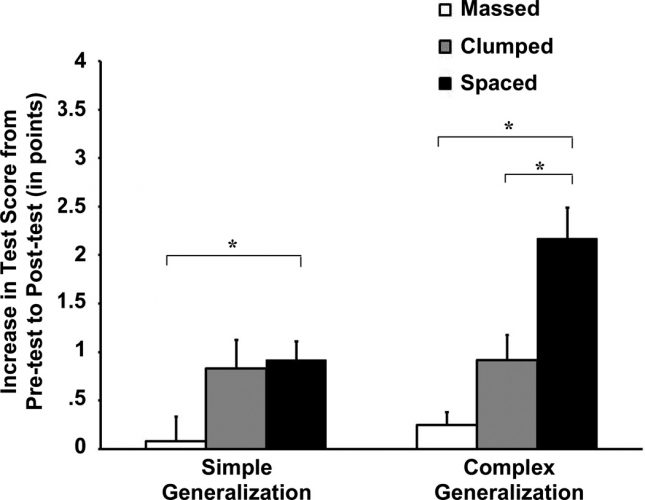
Another study compared comprehension scores under three different conditions:
- Read a text once (“single”)
- Read a text twice (“massed”)
- Read a text twice with a week-long gap (“distributed”)
When tested immediately, the second group performed best. But when tested with a delay of two days, the third group performed best.
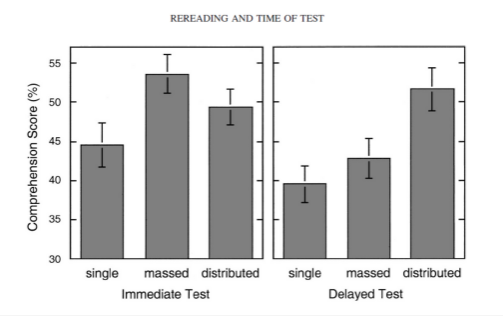
This method is also superior for learning motor skills.
How to apply this in practice:
Create a learning schedule or find time to practice a little bit every day or every few days instead of cramming all your learning into one or just a few days.
If you’d like to learn more, read the Wikipedia article on distributed practice.
Strategy #2: Active Recall (Retrieval) Practice
It might be more effective to actively retrieve the information you’ve already learned than passively re-read or try to learn it once again.
One study that compared a method that emphasized study sessions with a method that emphasized tests and found the latter to be more effective for delayed recall.
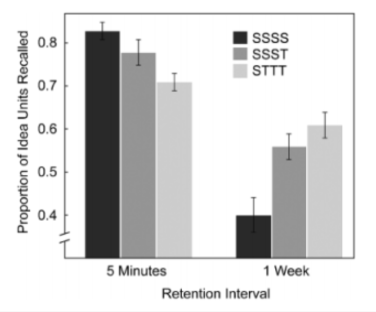
- SSSS = four study sessions
- SSST = three study sessions, followed by one test
- STTT = one study session, followed by three tests
Even imagining that you might be tested on the material you’re learning might help improve the recall.
How to apply this in practice:
If a few days ago you learned how past tense works in the Spanish language, try to remember the rules or even test yourself on your knowledge — instead of simply re-reading the same material once again.
You can read more about the active recall practice on Wikipedia.
Strategy #3: Distributed (Spaced) Recall Practice
Distributed recall practice is basically a combination of the two ideas above. You test yourself frequently and modify the test intervals depending on how familiar you’re with the material or how strong your skill is.
How to apply this in practice:
Many apps simplify the process by tracking one’s performance and adjusting the intervals automatically. Anki is a free and popular app that can be used for learning foreign language vocabulary as well as other things.
Strategy #4: Interleaving
Unlike the methods listed above, this one is not as widely used yet. The idea is simple: practice multiple skills at the same time. This can make practice more difficult but it pays off at the end. Sometimes this strategy is also called “varied practice”.
A 2010 study found that interleaved practice better prepares children for the complex tasks (full problems) — the ones you’re more likely to encounter in the real world — even though they make more mistakes during the practice.
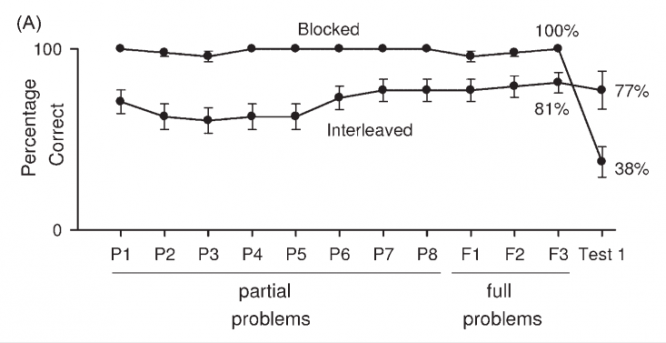
A 2007 study showed that students who mixed different tasks performed worse during the practice session but better in the subsequent test of their skills.
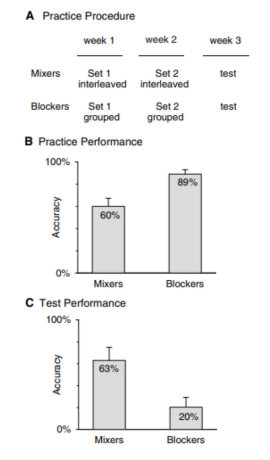
These two studies focused on math tasks — finding the volume of various geometric solids — but similar effects were found in other domains, such as badminton, basketball, and medicine.
How to apply this in practice:
- Interleave skills that are related — for example, different chord progressions
- Mix old and new skills to integrate them
You can learn more about interleaving by reading the Scientific American article and the Wikipedia article.
Strategy #5: Elaborative Interrogation (Quiz-And-Recall)
Elaborative interrogation is a fancy term for asking yourself questions while studying. Sometimes it’s also called “quiz-and-recall”.
One study found that asking questions is useful for acquiring science facts. Another one showed that this method is particularly effective when you already have certain prior knowledge about the subject. But even if you don’t, elaborative interrogation still appears to be more effective than simply reading to understand.
How to apply this in practice:
- Ask yourself a question that starts with “Why” or “How” and try to answer it based on the material you’ve learned.
Strategy #6: Self-Explanation and The Feynman Technique
This strategy is built on a similar idea. After learning something new, try to explain it in your own words. If you have a partner or anyone willing to listen to your explanations, you can practice with them but explaining things to yourself works too.
One study evaluated the percentage of correct answers and found this method effective:
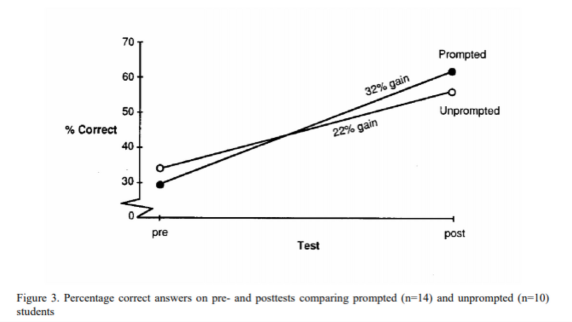
As some professors and teachers note, they not only teach to share knowledge but also to understand the subject better.
The method is similar to the so-called Feynman Technique attributed to the Nobel prize-winning physicist Richard Feynman. In addition to self-explanation, Feynman also emphasized that one should explain things simply so that even a sixth-grade student would understand them.
How to apply this in practice:
- Choose the subject you’d like to learn
- Pretend you’re teaching it to a sixth-grade student
- Notice the gaps in your understanding and use them to guide your further learning
A simple heuristic from my own experience:
I found that if whatever I learn can be practiced, then practice is superior to recall/explanations which are themselves superior to passive learning.
- For example with programming: write code to solve problems > explain how something works > learn passively.
- Similarly, with foreign languages: speak or write > remember/explain what you learned > passive learning.
Other Learning Strategies
- Deep work: turn off all distractions.
- Deliberate practice and chunking: break the big subject down into smaller manageable “chunks” that need to be learned.
- Learn in 25–50-minute blocks. See the Pomodoro technique.
- Take breaks and let your mind wander — both “focused” and “diffused” modes are important.
Biohacking Brain’s Health and Physiology
I have mixed feelings about the term “biohacking’ but I’ll use it here for the lack of a better word. The real question is whether we can do anything to make learning easier and more effective by changing our physiology.
Not surprisingly, the most studied, the safest, and the most effective “biohacks” are reminiscent of the advice some of us received from our grandmas.
Biohack #1: Sleep Well
This is hardly news to anyone. There are dozens if not hundreds of studies on the effects sleep deprivation has on cognitive performance and memory. And they all point in the same direction. Sleep takes time but it’s a secret weapon.
One study examined the effects of sleep deprivation on attention, working memory, executive function, speed of processing, and mood. You can probably guess what happened but these charts really bring the conclusions home:
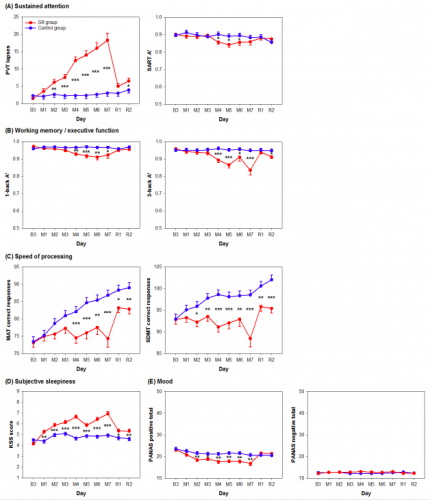
You can learn more about the effects of sleep and deep deprivation on cognition and health in the podcast episode with Matthew Walker, a professor at UC Berkeley.
Biohack #2: Exercise
After sleep, there is one more secret weapon that is free, very effective, and thoroughly studied. Yes, exercise.
The study published in Nature is only one of many that concluded that exercise can improve cognition across multiple task types.
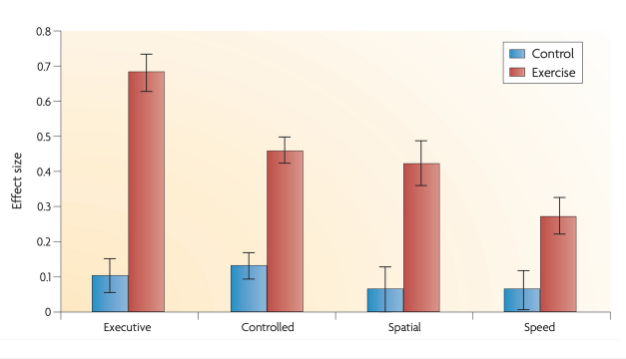
Even walking can be effective. Here is how walking affects creativity:
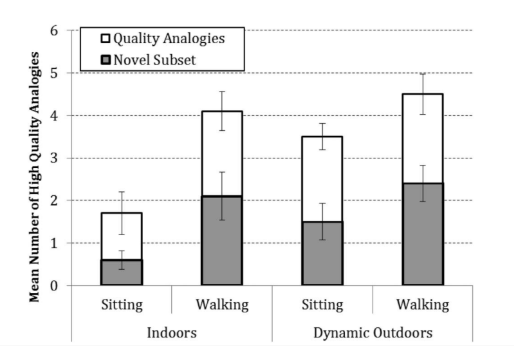
Exercise also increases brain-derived neurotrophic factor (BDNF) which is important for learning:
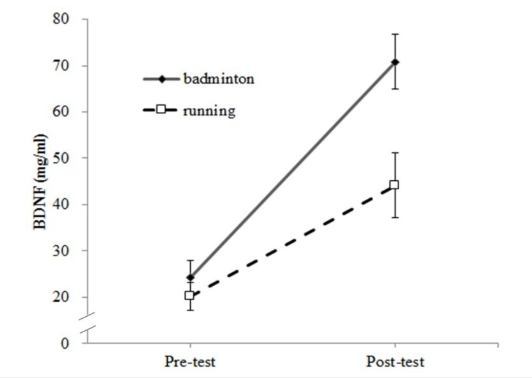
Finally, exercise has neuroprotective benefits and might even help prevent Alzheimer’s disease.
Different types of exercise have different effects so that it’s better to do a nice mix of resistance training (weight-training), high-intensity interval cardio training (HIIT), and low-intensity steady-state cardio training (LISS).
If you’d like to learn more about the effects of exercise on cognitive performance, check out the Wikipedia article on neurobiological effects of physical exercise.
Biohack #3: Eat Healthily
Just like sleep and exercise, nutrition might sound boring but it’s incredibly effective. Reviewing the principles of healthy nutrition is beyond the scope of this article but here are a few studies that might get you more excited about eating healthy.
Entire dietary approaches and individual foods have been studied in terms of their effects on cognition.
Foods that and nutrients that have been associated with better cognitive performance include green tea, fish, blueberries, nuts, olive oil, and many others.
Here are just a few study excerpts to spark your interest.
Blueberries have been shown to improve the reaction time and memory:
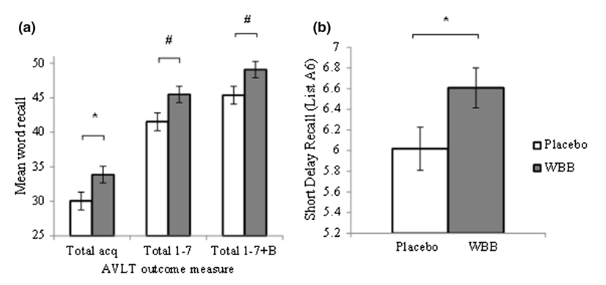
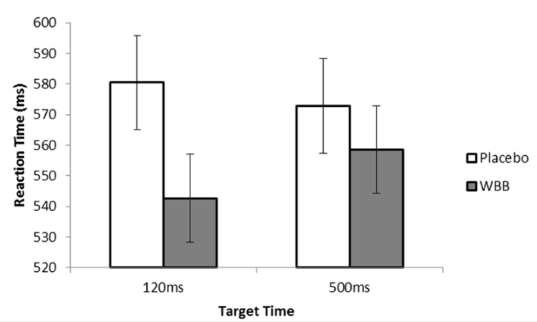
Omega-3 in fish oil — and in particular docosahexaenoic acid (DHA) — might improve cognition and delay age-related cognitive decline. And this randomized, controlled trial found beneficial effects of DHA on working memory scores:
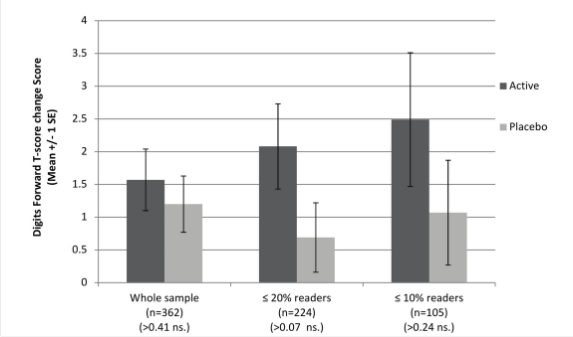
To learn more about the link between nutrition and cognition, check out the Wikipedia article on nutrition and cognition, the summary of the MIND diet, Chris Kresser’s article, and Rhonda Patrick’s podcast.
Other Brain Biohacks
- Meditate. Mindfulness meditation in particular has been shown to improve cognition.
- Drink coffee and green tea — they contain caffeine and l-theanine that have nootropic effects.
- Ensure you’re breathing clean air by opening windows and/or using an air purifier. CO2 and Particulate Matter (PM2.5) have been shown to reduce cognitive performance.
- Consider researching nootropic supplements but err on the side of caution — the methods outlined here are much more powerful and safer.
What Doesn’t Work
This post wouldn’t be complete without the list of popular yet ineffective methods. So here is a non-exhaustive list:
- Multi-tasking. Focus on one thing at a time instead.
- Passive re-reading and highlighting. Practice active recall instead.
- Finding your unique “learning style” — the theory behind Visual, Auditory, or Kinesthetic learning isn’t backed up by strong evidence.
More Resources
- Online course: Learning How to Learn
- Book: Your Brain at Work
- Book: Why We Sleep
- Book: Range: Why Generalists Triumph in a Specialized World
- Book: Brain Rules
- Book: The Talent Code
- Book: Deep Work
If you like my articles, please consider signing up for radically infrequent email updates. And say hi on Twitter! 👋
Originally published on Max's Two Cents on June 14, 2020.
12 comments
Comments sorted by top scores.
comment by MSRayne · 2023-02-27T01:23:28.690Z · LW(p) · GW(p)
Have you read Ultralearning? You're basically regurgitating the entire book. :)
EDIT: apparently two other people have said this...
EDIT 2: wait why am i commenting on a two year old post how did i even find this lol
↑ comment by Richard_Kennaway · 2023-02-27T12:00:53.409Z · LW(p) · GW(p)
It bears yesterdays's date, yet most of the comments on it are two years old. What strange witchery is this?
Replies from: niplav↑ comment by Sphinxfire (sphinxfire) · 2023-02-27T09:05:29.964Z · LW(p) · GW(p)
You using an RSS reader too?
Replies from: MSRayne↑ comment by MSRayne · 2023-02-27T13:15:19.205Z · LW(p) · GW(p)
No actually! I've tried to learn about RSS before but gave up because it seemed really obscure. What's it actually for?
Replies from: sphinxfire↑ comment by Sphinxfire (sphinxfire) · 2023-03-02T09:31:18.231Z · LW(p) · GW(p)
Nothing that fancy, it's basically just a way to keep track of different publications in one place by subscribing to their feeds. More focused and efficient than checking all the blogs and journals, news and other stuff you are trying to keep up with manually.
comment by adamShimi · 2020-11-24T22:19:25.413Z · LW(p) · GW(p)
Nice post. I do (or try to do) most of these, so I didn't learn much, but it's great to see a clear and concise explanation of them.
Two books that seem relevant to what you talk about:
- Ultralearning by Scott Young, which tries to integrate almost all the strategies you mention into one big framework.
- Spark by John J. Ratey, a pop science book about the value of exercise for cognitive function (and more!)
↑ comment by Jeroen De Ryck · 2023-02-27T15:58:45.996Z · LW(p) · GW(p)
Add Make it Stick to that list.
comment by Yiar · 2020-11-23T12:10:36.404Z · LW(p) · GW(p)
Also, I’d recommend thinking about learning in terms of the principles at Sparkwave’s 10 Conditions for Change. How to set up a design that aid oneself to actually do these demanding but effective learning behaviours, is key.
comment by JakubK (jskatt) · 2023-03-04T08:06:25.384Z · LW(p) · GW(p)
Does anyone have thoughts on Justin Sung? He has a popular video criticizing active recall and spaced repetition. The argument: if you use better strategies for initially encountering an idea and storing it in long-term memory, then the corresponding forgetting curve will exhibit a more gradual decline, and you won't need to use flashcards as frequently.
I see some red flags about Justin:
- clickbait video titles
- he's selling an online course
- he spends a lot of time talking about how wild it is that everyone else is wrong about this stuff and he is right
- he rarely gives detailed recommendations for better ways to study; this video has the most concrete advice I've seen so far
- I could not find any trustworthy, detailed reviews of his course (e.g. many of the comments in this Reddit post looked fishy), although I didn't search very hard
Nonetheless, I'm curious if anyone has evaluated some of his critiques. I think a naive reader could conclude from all the spaced recall hype that the best way to learn is "just do flashcards in clever ways," and this sounds wrong to me. One intuition pump: does Terrence Tao use flashcards?
comment by Yiar · 2020-11-23T12:06:37.392Z · LW(p) · GW(p)
Another book related to this is Ultralearning by Scott Young.
Have not read all chapters thoroughly as I’ve learned about many of these principles elsewhere, but this book seem to include most of the learning concepts you mention, as well as some of the CFAR concepts such as Turbocharging, Overlearning, Tutoring Wheel, and so on. I recall the author of Learning how to Learn calling it the best book on learning, so it might interest you! 🙂
Replies from: maxa